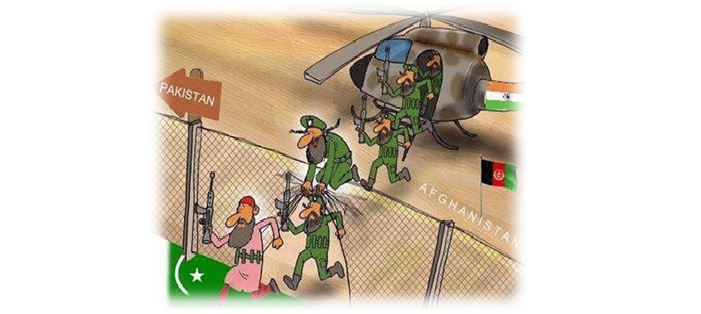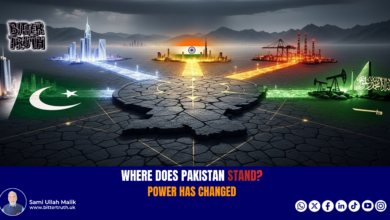The Taliban and Regional Countries: A New Strategic Reality
India’s Role in the Changing Politics of Afghanistan
When the United States and its allied forces completed their withdrawal from Afghanistan in 2021, accompanied by Ashraf Ghani’s departure and the collapse of his government, the Afghan Taliban came to power. At that time, most diplomatic and military experts in Pakistan believed that this significant change would strengthen Pakistan’s regional influence. This was attributed to the role Pakistan played in the Taliban’s victory, including countless sacrifices, hosting millions of Afghan refugees, and providing unwavering support. It is well-known that, without Pakistan as a loyal neighbour, the Soviet Union might not have faced such a decisive defeat in Afghanistan, which led to its fall as a global superpower and its eventual division into six states. Likewise, the United States and its allies would not have been forced into such a humiliating retreat.
However, despite these sacrifices, the relations between the two brotherly Muslim countries, Pakistan and Afghanistan, have remained tense. Unfortunately, this tension began shortly after the Taliban assumed power in Afghanistan.
In August 2021, when the Taliban took control of Afghanistan, Pakistan’s then-Prime Minister Imran Khan remarked that the Afghan people had “broken the chains of slavery.” It is worth noting that after the Taliban established their government, Pakistan’s then-Director General of Inter-Services Intelligence, Lieutenant General Faiz Hameed, made a sudden visit to Kabul on 5th September 2021. His photographs, particularly one holding a cup of tea in a hotel lobby, became prominent in the media. During an informal conversation with journalists at the time, he said, “Don’t worry, everything will be fine.” However, this visit was later viewed as a significant mistake by the institution he represented, one whose repercussions Pakistan continues to face. General Faiz Hameed is now under the custody of his former institution and facing a court-martial.
Over the past four years, circumstances have rapidly changed, and Pakistan and the Taliban now seem to be at odds. Pakistan has repeatedly demanded action from Kabul against the banned Tehrik-i-Taliban Pakistan (TTP), which, according to Pakistan, is using Afghan territory to launch attacks. The Taliban government has consistently denied these allegations. In late December last year, Pakistan conducted intelligence-based operations in Afghan border regions, prompting severe protests from the Afghan Taliban government. The Taliban warned that Afghanistan’s territorial sovereignty was a “red line” for their Islamic Emirate and vowed to respond. This was followed by incidents of cross-border firing on Pakistani border posts.
India, unsurprisingly, also condemned Pakistan’s recent “airstrikes” in Afghanistan, as it continues to align closely with the policies of its ally, the United States, in the region.
Initially, Pakistan anticipated that the Taliban’s return to power in Afghanistan would lead to regional stability and a weakening of India’s influence in the region. However, in recent months, growing closeness between India and the Afghan Taliban has emerged as a red flag for Pakistan.
The fall of Ashraf Ghani’s government was initially perceived as a major setback for India, which had invested billions of dollars in Afghanistan during his tenure. Yet, in the past few months, India has strengthened its ties with the Taliban. On 8th January, India’s Foreign Secretary Vinay Mohan Kwatra met the acting Foreign Minister of the Taliban, Amir Khan Muttaqi, in Dubai. Both sides agreed to enhance trade and strengthen cooperation.
The Taliban’s Ministry of Foreign Affairs stated that Afghanistan considers India an important regional and economic partner. This meeting marked the highest-level interaction between the Taliban administration and India since the Taliban assumed power in 2021. Discussions also included increasing trade via Iran’s Chabahar Port. India is developing this port to bypass Pakistan’s Karachi and Gwadar ports and establish trade routes with Afghanistan, Iran, and Central Asia.
After the meeting, Afghanistan’s Ministry of Foreign Affairs issued a statement highlighting that its foreign policy is balanced and focused on strengthening the economy. It expressed a desire to bolster political and economic partnerships with India. India’s Ministry of External Affairs also stated that it is considering restarting developmental projects in Afghanistan and enhancing trade relations.
Notably, no country, including Pakistan, has officially recognised the Taliban government. India is among those nations. However, the recent meeting between the Taliban and India in Dubai has sent a significant message to Pakistan.
In an article for The Hindu, Indian journalist Nirupama Subramanian wrote that the Shahtoot Dam on the Kabul River is a priority for the Taliban. In 2020, India and Afghanistan signed a $250 million agreement for this project, which stalled after the Taliban’s return to power. Now, the Taliban are urging India to resume the project.
Husain Haqqani, Pakistan’s former ambassador to the United States, stated during an interview with a Pakistani news channel that Pakistan had expected the Taliban to secure Kabul and ensure Pakistan’s future stability. Instead, he said, “they have become a burden for us.”
Haqqani later tweeted that the meeting between Indian Foreign Secretary Vinay Mohan Kwatra and the Taliban’s Foreign Minister should serve as a lesson for Pakistan’s policymakers, who believed the Taliban’s rise in Afghanistan would benefit Pakistan and diminish India’s influence. He added, “Understanding foreign policy requires expertise. Being a brigade commander does not mean you understand everything.”
The Shifting Dynamics of Afghanistan, Pakistan, and India
Christopher Clary, a professor of political science at the University of Albany, wrote, “For decades, U.S. policymakers have told Pakistan that supporting the Taliban is unlikely to yield strategic benefits. Now, things are becoming clear.” Contrary to Pakistan’s expectations, the rise of the Taliban in Kabul has led to a surge in militant attacks within Pakistan. According to the Pakistan Centre for Conflict and Security, November 2024 saw the highest number of attacks, with 240 people killed, including approximately 70 security personnel.
Michael Kugelman, director of the South Asia Institute at the Wilson Center, commented on the growing ties between India and the Taliban, stating, “One could argue that India’s increasing closeness with the Taliban is an attempt to outmanoeuvre Pakistan in Afghanistan. However, there is also a practical aspect: India does not want Afghan soil to be used for terrorist attacks against it.” He further added, “India also seeks to strengthen ties with Afghanistan via Iran’s Chabahar port, which could serve as a gateway to Central Asia. Such initiatives could foster trust among the Afghan populace. While Pakistan desires the Taliban to control its adversaries within Afghanistan, the Taliban seems reluctant to do so, which benefits India. However, India-Taliban relations shouldn’t solely be viewed through a Pakistan-centric lens.”
Stanley Johnny, International Editor at The Hindu, wrote, “Both India and the Taliban wanted to maintain contact with each other since 2021, driven by various reasons. India has invested heavily in Afghanistan and is concerned about terrorism. The Pakistan factor is also significant, as the Taliban seeks independence from Pakistani influence, presenting an opportunity for India. This does not imply that India is in a hurry to normalise relations with the Taliban, but the two sides will continue to explore opportunities at a gradual pace.”
Abdul Basit, Pakistan’s former High Commissioner to India, remarked that Pakistan’s Afghanistan policy has failed miserably, pointing to a lack of clear strategy. While Pakistan discusses trade and relations with Afghanistan, militant attacks simultaneously escalate. He believes the banned Tehreek-e-Taliban Pakistan (TTP) is the biggest obstacle to improving relations, as the group’s safe havens in Afghanistan remain a source of conflict.
The intertwined relationship between Afghan and Pakistani Taliban has historically involved cooperation, but Pakistan now finds itself forced to conduct operations against TTP sanctuaries in Afghanistan. This necessity arises from the Afghan Taliban’s unwillingness to take direct action against the TTP.
Meanwhile, former Afghan diplomats have raised concerns over increasing ties between India and the Taliban. M. Ashraf Haidari, former Afghan ambassador to Sri Lanka, India, and the U.S., criticised the recent meeting between Vikram Misri and Taliban representatives, describing it as a betrayal of Afghanistan’s people. He argued, “This is a betrayal of Afghan democracy, freedom, and human rights. Just as Pakistan has regretted betraying its values, India may also face repercussions. Let us not forget that the Taliban have vowed to fight for Kashmir’s liberation and previously destroyed the Buddhas of Bamiyan, which were part of our cultural heritage.”
Farid Mamundzay, Afghanistan’s former ambassador to India, asserted that no dialogue with the Taliban could be legitimate without addressing the concerns of oppressed Afghan citizens. He urged prioritising the rights of Afghan women and children and resolving the ongoing humanitarian crisis.
The meeting between an Indian delegation and Taliban officials in Kabul has drawn significant attention, with observers viewing it as a step toward improving relations. Recently, J.P. Singh, a senior official from India’s Ministry of External Affairs, led a delegation to meet acting Afghan Defence Minister Mullah Mohammad Yaqoob, acting Foreign Minister Amir Khan Muttaqi, and former Afghan President Hamid Karzai. This marked the first official meeting between an Indian ministry representative and Mullah Yaqoob, a prominent leader and the son of the Taliban’s founder, Mullah Omar.
India’s Ministry of Defence posted a photo of the meeting on X, highlighting discussions to strengthen ties. The Taliban have repeatedly expressed interest in fostering relations with India, particularly in the defence sector. Historically, India trained Afghan military personnel, and large numbers of Afghan soldiers attended Indian military academies.
Professor Balqees highlighted that India-Afghanistan relations have traditionally been strong. “Since the Taliban’s rise, India has limited visas for Afghan citizens. However, recent talks also addressed student, business, and medical visas for Afghans, reflecting India’s growing interest in restoring ties.”
India’s strategic goals include ensuring that Afghanistan does not exclusively fall under the influence of China and Pakistan. Following the meeting, the Taliban’s Ministry of Defence emphasised the need to expand mutual relations. Indian media reported that this interaction indicates India’s readiness to go beyond humanitarian aid and explore broader engagement. Future developments are expected to bring both nations closer, despite the absence of formal diplomatic ties.
India’s Offer to Afghanistan and Diplomatic Shifts in the Region
India’s Ministry of External Affairs spokesperson, Randhir Jaiswal, stated during a media briefing on Thursday that Indian officials offered Afghanistan trade opportunities via Iran’s Chabahar Port during discussions with Afghan leaders. According to him, Indian representatives explained how Iranian traders and businessmen could benefit from exporting, importing, and conducting other business activities through Chabahar Port, which is being developed by India. This port is often viewed as an alternative to the Gwadar Port in Pakistan, constructed by China.
A few weeks before this meeting in Kabul, some Taliban officials had visited Delhi. Over time, India has gradually taken steps to establish relations with the Taliban government in Afghanistan.
Despite the Taliban’s takeover of Afghanistan in 2021, India has not officially recognised their government. The Afghan diplomats from the previous administration have already departed from Delhi. While no country has formally recognised the Taliban regime, regional nations like China, Russia, Pakistan, Iran, and Qatar continue to operate embassies in Kabul. Recently, India resumed its diplomatic mission in Kabul.
The Taliban have repeatedly urged India to allow the appointment of their diplomats in Delhi. This matter was also raised during the meeting, and reports now suggest that India may be considering permitting the posting of Taliban diplomats in Delhi. The Taliban have assured India on multiple occasions that Afghan territory would not be used for anti-India activities.
Pakistan-Taliban Relations
Over the years, the relationship between Pakistan and the Taliban has experienced ups and downs. Pakistan’s Foreign Office has consistently urged the Afghan Taliban to ensure that their territory is not used for attacks on Pakistan. However, Taliban officials claim that Afghan soil is not being used for such purposes.
India’s Regional Engagement
This year, India’s relations with its neighbours have been marked by challenges. In October, India agreed to extend financial assistance to the Maldives for its economic recovery, despite strained ties earlier in the year. In May, Indian authorities expressed displeasure over Nepal’s issuance of a 100-rupee banknote featuring its new map. Meanwhile, Bhutan has been working on improving its diplomatic ties with China.
In Sri Lanka, left-leaning politician Anura Kumara Dissanayake, perceived as pro-China, was elected president in September. Bangladesh’s former Prime Minister Sheikh Hasina remains in India, where the issue of granting her political asylum is being debated.
India’s Cautious Approach with the Taliban
Foreign affairs experts in India believe there is a mutual lack of trust between the Taliban government and India. While India has not recognised the Taliban government, allowing Taliban diplomats to work in Delhi’s Afghan embassy would be a significant step towards formalising relations. However, India continues to adopt a “wait-and-watch” policy.
On the other hand, Pakistan’s Foreign Office spokesperson mentioned in August that the interim Afghan government must fulfil its commitments to its citizens and the international community. Ensuring that Afghan territory is not used against its neighbours would pave the way for recognition.
Geopolitical Strategies and Observations
Observers note that India’s current government appears aligned with the policies of its new ally, Trump, and is actively working within the Troika framework to obstruct the completion of Pakistan’s China-Pakistan Economic Corridor (CPEC) project. In this context, Afghanistan’s strategic importance in the regional landscape has increased, and India’s government is now moving towards fully restoring ties with the Taliban regime.
However, it is crucial to recognise that the same Taliban, who are now assuring India that their territory will not be used for anti-India activities, had previously made similar commitments to the global community in Doha. The Taliban must also acknowledge the sacrifices made by Pakistan, which enabled them to achieve their current position. Ignoring such contributions could result in consequences far more severe and unexpected for India in the future.
Finally, the Taliban’s leadership should remember the divine principle articulated in the Quran:
“Is the reward for good [anything] but good?” (Surah Ar-Rahman 55:60).






